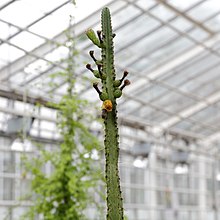Samaipaticereus is a monotypic genus of cactus containing the sole species Samaipaticereus corroanus. It is known only from East Andean Bolivia and Peru.[2]
| Samaipaticereus | |
|---|---|

| |
| Scientific classification | |
| Kingdom: | Plantae |
| Clade: | Tracheophytes |
| Clade: | Angiosperms |
| Clade: | Eudicots |
| Order: | Caryophyllales |
| Family: | Cactaceae |
| Subfamily: | Cactoideae |
| Genus: | Samaipaticereus Cárdenas |
| Species: | S. corroanus
|
| Binomial name | |
| Samaipaticereus corroanus | |
Description edit
Samaipaticereus corroanus grows tree-like and columnar, is heavily branched and reaches heights of 2 to 4 meters. The green, long, upright shoots are not articulated and reach a diameter of up to 8 centimeters. Five spines usually arise from the areoles of the four to six ribs, which cannot be differentiated into central and radial spines. They are short and greyish white, one of them longer than the others and pointing downwards.
The numerous, constricted, funnel-shaped flowers are 4.5 to 5 centimeters long, open at night and remain open until the following day. The sepals are greenish white with brown tips, the petals are white. The pericarpel and the flower tube are covered with long scales, short hairs and some bristles.
The spherical, truncated, tuberous fruits are more or less pink, have a perennial remnant of flowers and tear open lengthwise. The pulp is reddish-orange. The dark brown or blackish seeds are shiny, about 1.5 millimeters long and tiny dotted. The hilum is wide.[3][4]
Taxonomy edit
The first description by Martín Cárdenas was published in 1952.[2] The genus name is derived from the town of Samaipata in Bolivia, near where the species was first collected.[5] For the second species Samaipaticereus inquisivensis he described, the genus Yungasocereus was established by Friedrich Ritter in 1980.[6]
Distribution edit
Samaipaticereus corroanus is distributed in Peru (Cuzco) and eastern Bolivia.[7]
References edit
- ^ "The IUCN Red List of Threatened Species". IUCN Red List of Threatened Species. 2010-09-22. Retrieved 2023-08-25.
- ^ a b "Samaipaticereus Cárdenas", Plants of the World Online, Royal Botanic Gardens, Kew, retrieved 2022-03-05
- ^ Anderson, Edward F.; Eggli, Urs (2005). Das grosse Kakteen-Lexikon (in German). Ulmer. p. 578. ISBN 3-8001-4573-1.
- ^ Backeberg, Curt (January 1983). Die Cactaceae : Handbuch der Kakteenkunde. 2. Cereoideae : (Hylocereeae - Cereeae [Austrocereinae]) (in German). Fischer. pp. 1090–1092. ISBN 3-437-30381-3.
- ^ "Cactus and Succulent Journal Sept-Oct 1952: Vol 24 Iss 5 : Free Download, Borrow, and Streaming : Internet Archive". Internet Archive. 2023-03-25. Retrieved 2023-08-25.
- ^ "Yungasocereus F.Ritter". Plants of the World Online. Royal Botanic Gardens, Kew. Retrieved 2023-10-16.
- ^ "Samaipaticereus corroanus Cárdenas". Plants of the World Online. Royal Botanic Gardens, Kew. Retrieved 2023-10-16.
External links edit
- Media related to Samaipaticereus at Wikimedia Commons
- Data related to Samaipaticereus at Wikispecies
